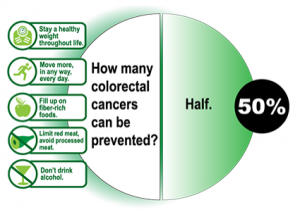Over the past three decades there’s been a slight but steady decline in colorectal cancer incidence here in the US, thanks in large part to increased screening. Now a study out this week showing that rates of this cancer are increasing among young people — below the typical screening age — highlights the importance of people of all ages adopting healthy behaviors that can halve the risk of colorectal cancer.
The study – published in JAMA Surgery – found that among 20- to 34-year-olds, the data indicates incidence of colon and rectal cancer will increase by 90% and 124%, respectively, by 2030. Among the 35 to 49 year olds, rates are estimated to increase by 28% and 46%, respectively.
This large study confirms previous research on incidence trends, and it points to a growing public health problem, the authors note. Lifestyle and behavioral factors such as obesity may be a possible cause.
AICR estimates that half of all colorectal cancer cases are preventable if people were to eat healthier diets, move more and stay lean.
The latest Continuous Update Project report on colorectal cancer found that risk increases with eating high amounts of red meat (over 18 ounces per week), consuming even small amount of processed meat regularly, drinking alcohol and being overweight or obese. Risk of colorectal cancer decreases with physical activity, eating foods with fiber and garlic.
Adding to the troubling trend found in the study is that the younger patients were more likely to be diagnosed with the advanced stages of the disease. In these stages, the cancer has spread to close or distant organs.
Study authors used data from a comprehensive government Surveillance, Epidemiology, and End Results (SEER) database. They looked at age at diagnosis and stage of the disease in 15-year intervals starting at age 20.
Colorectal cancer is the third most common cancer among men and women. This year, the National Cancer Institute estimates that 136,830 people will be diagnosed with colorectal cancer and 50,310 people will die from the disease.
You can find more information on how to reduce your risk of colorectal cancer with diet, activity and weight control in our Learn More section.





